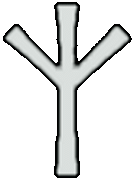| |
Algiz
|
 |
Pronunciation: all-yease
Literal Meaning: Protection or Defence; Later Elk or marsh creature of some sort
Other Names: Eolih, Elhaz, Eolh-secg, Eolx, Eolhx, Iolx, Elux , Ihwar
Phonetic Value: Z, sometimes rolling R at end of word
|
| Rune Poems |
| Anglo Saxon |
Secg eard hæfþ oftust on fenne ƿexeð on ƿature, ƿundaþ grimme blode breneð beorna gehƿylcne ðe him ænigne onfeng gedeþ. |
| The warrior often has homeland at the fens growing in water, wounds and rages every hot blooded man everyone a duty to do. |
| |
| Norwegian |
Not listed. |
| |
| Icelandic |
Not listed. |
|
Though the name and origin of this rune are a mystery due to a linguistic shift, Algiz is usually considered the rune of protection.
|
A note on historical usage:
Algiz is not historically the Totenrune or “death rune”. This is part of Nazi propaganda that decided that Algiz meant “life or birth” and so if inverted meant death. Though these symbols continued to be used on grave markers at least through the late 1900s, it is still a relatively modern practice.
A note on translation:
The name given to the rune in the poem eolh secg literally means "elk sedge", and is thought to represent a plant. However, much is unknown about this rune due to a linguistic shift and damage to the original manuscript containing the poem.
As such this line us usually translated as “The elk sedge usually lives in the fen, growing in the water. It wounds severely, staining with blood any man who makes a grab at it.”
Many have suggested that eolh secg is a derivative of Algiz, which literally means protection, and is the root of the words ealh, meaning sanctuary, and ealgian, meaning to defend. In lack of a more complete historical record the Proto-Germanic name has become commonplace for this rune.
The translation is not without problems, secg is context dependant and can mean sword, warrior, or hero as well as sedge, or sawgrass. Many of the other words are equally context specific. For instance, onfeng can mean material things, rite, or to perceive. Translation is also complicated by two unknown terms ƿature and breneð. Though they are usually parsed as “water” and “hot or burning” these are entire contextual approximations of meaning.
The proposed translation used in this entry is from individually translating the possibilities of each word with Anglo Saxon dictionaries and then attempting to reconstruct the meaning.
|
|
|
|
|